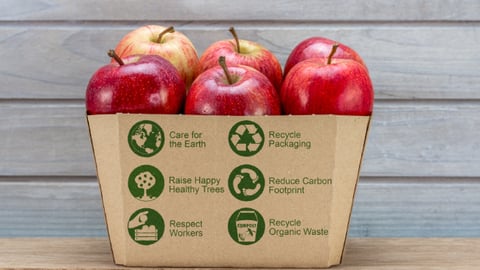How Circulr gives the grocery sector a way to boost sustainability
Kitchener, Ont.-based Circulr is a reuse program that helps CPG brands recapture and reuse packaging to reduce waste, while rewarding consumers for returning packaging and keeping it in circulation longer. Founded in 2020 by university graduates Tyler De Sousa and Charles Binks-Collier, Circulr works with a growing roster of brands including Funky Ferments, Beck’s Broth and Alchemy Pickle Company, and offers private-label reuse programs for grocery retailers. In this Q&A, De Sousa talks about the thinking behind Circulr, how it works and what comes next.
Tell me a bit about your background and how you came to co-found Circulr
My co-founder Charles and I both graduated with business degrees from Wilfrid Laurier University in the middle of the pandemic. After graduating, I founded a company that helped customers support local businesses during the pandemic… Following that, I was accepted into Next 36, which is a 10-month entrepreneurship program for Canada’s top young entrepreneurs. There, I reconnected with Charles, who was in the program to work on his idea for Circulr, and it just grew from there. We spent about a year in the Next 36 program developing the business, which we registered in late 2020 and launched the following year.
READ: Grocery leaders share how they’re prioritizing their sustainability efforts
What attracted you to the whole idea of a circular economy?
It’s a solution I think a lot of people have been waiting for… To me, a circular economy is an environmental solution that is more holistic, rather than a band-aid solution. It’s less about taking garbage out of the ocean and more about making sure it doesn’t end up there in the first place.
How does Circulr work?
We like to use the analogy of The Beer Store in Ontario [which takes back empties for reuse]. From a high-level systems perspective, Circulr runs the back-end infrastructure for the reuse of product packaging in grocery. We currently work with brands that have products in glass jars, such as pickles, peanut butter, pasta sauces, soups, spreads and soaps. So, customers can purchase a brand’s products like they normally would. When the consumer is done with the product, they just rinse out any residue in the jar and drop it off in a Circulr bin at one of 23 collection sites [located in grocery stores] across Toronto and the Waterloo/Wellington region. They can track their return through the Circulr mobile app and get their deposit back. [Deposits range from 10 cents to $1.25]. On the retailer front, we help grocers reuse packaging for some of their private-label products. The Stone Store in Guelph, for example, has their own private-label jarred products and we provide the infrastructure for the store to collect jars and reuse them.
What feedback have you received from brands and what do they say about Circulr’s advantages?
Beck’s Broth is a company out here in Kitchener-Waterloo that upcycles beef bones to make products like Bone Broth Cold Brew Coffee and Bone Broth Hot Chocolate. The owner, [Rebecca Prime], is passionate about the environment and was interested in reuse when she started the company. But she didn’t have the know-how or capacity to run a reuse program as the company continued to scale. That just happened to be when we came along. We’ve heard from many brands that reuse is something they have always wanted to do or have been more interested in doing in recent years, but the back-end operations are too cumbersome. They don’t want to take their focus off doing what they love and what they’re good at. And so, we come in and make it easy for them.
READ: Canadians prefer to shop from companies with circular economy initiatives
One of the biggest positives is the brand boost. People are starting to view reuse and the circular economy as an important environmental initiative, so being a part of Circulr reflects positively on the brand. On top of that, most customers who come into a store to return an empty jar leave with a full one. If I have a Funky Ferments pickle jar in my hand when I walk back into the grocery store, I’m going to remember Funky Ferments and buy another one.
What do you see as the potential for Circulr – and what’s next?
Glass jars were the first step in this process because there were a ton of logistical factors involved in setting up Circulr… But [we] can expand to a lot of other products, from cleaning products to bathroom products to cosmetics. There is obviously some packaging that won’t work – and I recognize I likely won’t ever bring back my Twix wrapper to a grocery store. Hopefully there will be some compostable alternatives at some point. But I think it will work for a lot of different products. In terms of scaling, reuse is quite local inherently and that makes sense environmentally and logistically. You need to do it on a hub basis. That’s why we have a Waterloo/Wellington hub that covers four cities and a Toronto hub that covers Etobicoke to Whitby. Our focus over the next year or so is to get more customer density in our existing hubs, then expand outwards into the wider GTA. After that, I think we’ll add our third hub sometime in late 2024 or early 2025. Right now, we just want to build a strong movement in these cities that could one day grow across the country.




